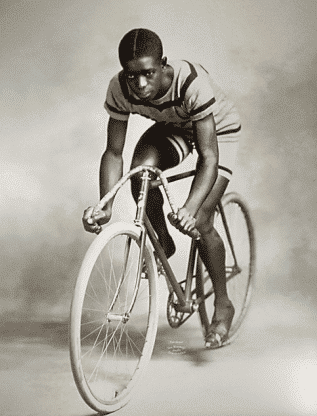
BikePGH honors Black History Month
Major Taylor: Champion Cyclist and Model Citizen
At the end of the 19th century, a figure emerged in the world of professional cycling who would not only break many cycling records throughout his career, but would tear down countless barriers that kept non-white athletes from public competitions. Major Taylor—born Marshall Walter Taylor in 1878—sustained an interest in bicycles from a young age and developed a reputation as a talented rider and stunt artist before he reached his teenage years. From the age of twelve, when he received his own bicycle, to the age of 32, Major Taylor gained worldwide fame as a world champion sprint cyclist. He won his first title in Montreal in 1899. That year, he broke seven world records and was launched into the global spotlight as an athlete of the highest caliber.
Underlying Major Taylor’s well-known athletic victories was a more serious set of victories: namely, he was the first non-white cyclist to enter into a highly public sport dominated by white athletes. Despite deeply entrenched racism among spectators, sponsors, and fellow athletes, Taylor remained committed to refining his talent and enjoying the sport, while simultaneously keeping his eye on victory in competition. His reputation as a calm, focused and kind athlete survives to this day.

Victory in the Face of Racism
Obstacles that Taylor had to overcome because of his race were manifold and ubiquitous. Even after, or perhaps especially after, Major Taylor had gained national notoriety, he faced blatant racism not only as a person but also as a increasingly well-known athlete. In 1897, Taylor was forced to abandon a national championship points-setting record because key competitions in many states would not allow him to compete due to his race. Major Taylor had to endure threats to his life, including one incident at a race in Taunton, Massachusetts, where a fellow competitor dismounted his bike, accosted Taylor, and choked him to the point of unconsciousness. The assailant faced a small fine of $50 and was allowed to continue competing professionally after the assault on Taylor.
In 1902, Major Taylor embarked on a European tour, where he handily bested the top cyclists in France, Germany, and England in a series of national competitions. In fact, of the 57 races that Taylor entered while in Europe, he won 40 of them. This solidified Major Taylor’s place as an international celebrity, which only grew as he won numerous races in 1903 in far-flung Australia and New Zealand as well. As Taylor’s victories spread beyond tracks in America, he enjoyed vehement followings abroad, particularly in France, where he won a number of races in Paris while on his European tour. While European newspapers made frequent references to Major Taylor’s skin color, threats and experiences of violence were nearly absent while in Europe, a stark contrast to his experiences in the United States.
Beyond the Track
Beyond the cycling track, Taylor was the victim of different forms of racism. After becoming quite wealthy due to his professional winnings and sponsorships, Major Taylor bought a home in an affluent all-white neighborhood in Worcester, Massachusetts. His neighbors were incensed and protested the presence of a non-white resident in their neighborhood, even offering Taylor a large sum of money if he would sell his newly purchased home. Taylor staunchly refused, and his neighbors slowly came to accept him as a distinguished member of the community.
Taylor’s legacy of commitment and sportsmanship continues to this day, particularly through dozens of Major Taylor Cycling Clubs that continue to enjoy active, diverse membership in the United States and around the world. Here in the City of Bridges, we are lucky to have the robust Pittsburgh Major Taylor Cycling Club, which supports events and rides throughout the region. In addition to this, Taylor’s daughter, Sydney Taylor Brown, donated a collection of Major Taylor’s press clippings and personal memorabilia to the University of Pittsburgh in 1984, and remains a unique historical resource that connects Taylor’s profound legacy to Pittsburgh.
Besides his exemplary athletic prowess in the face of racist attitudes, Major Taylor is perhaps best remembered by his famous quote — an example of the champion’s unmatched sense of integrity: “Life is too short for any man to hold bitterness in his heart.”
Sources:
- Lynne Tolman, “Champion Cyclist Beats Jim Crow,” Major Taylor Association, Inc., February 8, 1998, http://www.majortaylorassociation.org/JimCrow.htm.
- Anonymous, “A History of the Pittsburgh Major Taylor Cycling Club,” PMTCC, 2016, http://www.pmtcc.org/history/.
- Lesa Cline-Ransome and James E. Ransome, Major Taylor Champion Cyclist (New York: Atheneum Books, 2004).
- Photos via Wikimedia Commons
- Archives and Manuscripts Collection, University of Pittsburgh Library System. http://digital.library.pitt.edu/cgi-bin/f/findaid/findaid-idx?c=ascead;cc=ascead;q1=major%20taylor;rgn=main;view=text;didno=US-PPiU-ais198407
2 Comments
[…] Part 4: Major Taylor: Champion Cyclist & Model Citizen […]
[…] Part 4: Major Taylor: Champion Cyclist & Model Citizen […]